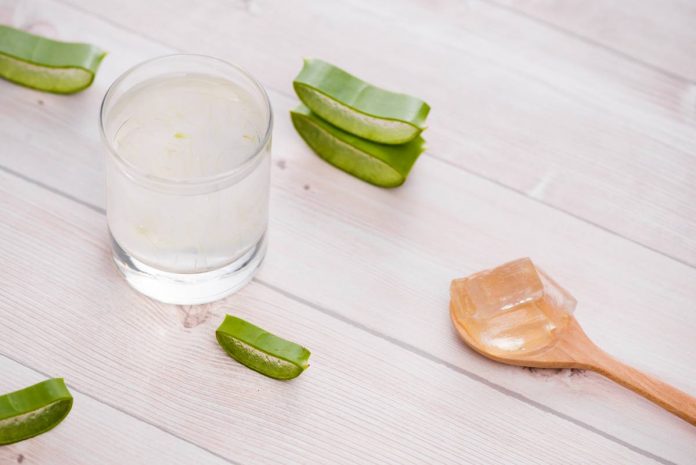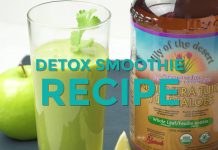
What’s the first thing you think of when you hear the words “aloe vera”? Lots of people mention how the gel can ease the pain of burns, cuts, sunburn, and scrapes. Some people keep an aloe vera plant in their kitchen and the gel in their medicine cabinets for these purposes.
But aloe vera gel and juice possess many other benefits that we often don’t hear about, and we would like to change that. How many of these aloe vera uses are you ready to try?
Read about 9 reasons to use aloe vera juice every day
Supplement companion and absorption enhancer
Have you ever thought of taking aloe vera to boost the vitamins you ingest? Research shows that aloe vera juice or gel, when taken with vitamin C, supports the blood levels of this antioxidant by more than 20 times that of water.
In a randomized, placebo-controlled trial of aloe vera, a research team evaluated the bioavailability of vitamins C and B12 when given with aloe inner leaf gel and aloe whole leaf gel compared with placebo. Both of the aloe vera supplements increased plasma oxygen radical absorbance capacity (ORAC) as well as plasma levels and bioavailability of vitamins C and B12.
Did you know that aloe vera is the only known supplement that can increase the absorption of vitamins C and E? Study results appearing in Phytomedicine noted that both whole leaf extract and inner fillet gel of aloe vera slowed absorption of these two vitamins and that the nutrients remained in the plasma longer.
Aloe vera for proactive health regimens
More and more people are being proactive when it comes to their health: choosing healthier foods, getting more exercise, managing stress, and taking supplements. Adding aloe vera to your program could provide a broad umbrella of support and prevention. In a study appearing in the Organic and Medical Chemistry Letters, for example, the investigators reported that “Due to its phytochemical composition, A. vera leaf gel may show promise in alleviating symptoms associated with/or prevention of cardiovascular diseases, neurodegeneration, and diabetes.”
A healthy environment for probiotics
Your digestive tract (gut) is home to a variety of microorganisms, including beneficial and harmful bacteria that can easily get out of balance because of stress, exposure to toxins and other harmful substances, poor diet, and other factors. One way to help restore balance in the gut is by providing the body with probiotics (beneficial bacteria). Taking aloe vera on a daily basis helps create a healthy intestinal pH environment for probiotics to thrive.
According to registered dietitian Melissa Rifkin, “Aloe vera juice helps to maintain the ‘good’ bacteria in your gut to keep your gut flora balanced.” She also noted that keeping your gut bacteria in balance “can improve overall digestion and feeling bloated or gassy.”
Aloe vera also helps keep damaging bacteria under control so they can’t cause further damage to your digestive tract. The antioxidants in aloe vera, known as polyphenols, assist in inhibiting the growth of bacteria that can result in infection and disease.
Read about aloe vera and the immune system
Aloe vera as an adaptogen
An adaptogen is a natural substance that helps the body to resist and adapt to stress and provides a balancing, restorative effect that promotes normal physiological functioning. Aloe vera fits this definition, as it can help strengthen the immune system, calm inflammation, reduce blood pressure, ease digestion, and work to balance blood sugar.
Aloe vera eases stomach acid
Abnormal levels of stomach acid can play havoc on your stomach and your daily activities. One condition associated with stomach acid problems is GERD (gastroesophageal reflux disease). One study compared aloe vera with two different acid-blocking medications. The three groups were given either 10 ml of aloe vera syrup, 20 mg omeprazole capsules, or 300 g ranitidine tablets for four weeks.
Aloe vera was equally as effective as the drugs, including heartburn, belching, nausea, vomiting, food and acid regurgitation, flatulence, and dysphagia. None of the individuals taking aloe vera dropped out because of side effects, but four individuals taking the medications withdrew because of side effects.
Bottom line
Aloe vera may be great for burns and scrapes, but it also provides health benefits you can enjoy every day. Research indicates there are several good reasons to make aloe vera supplements a part of your daily health routine. Whether you take aloe vera to boost your nutrient intake, ease your digestion, balance your gut, or enhance your overall health, aloe vera juice and gel may provide you and your family with better well-being and the feeling you are being proactive with your health.











